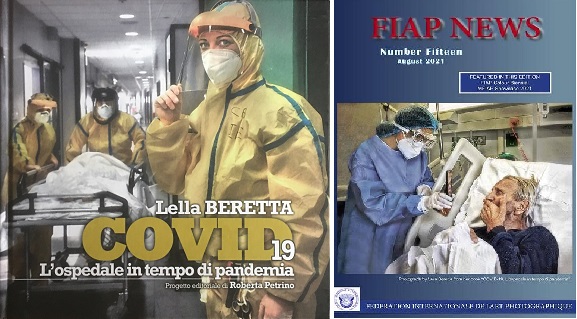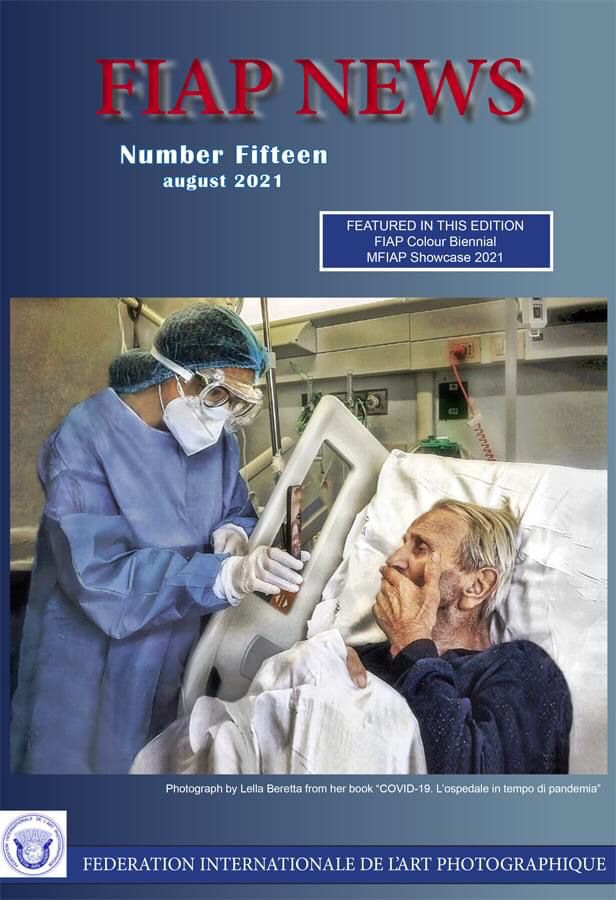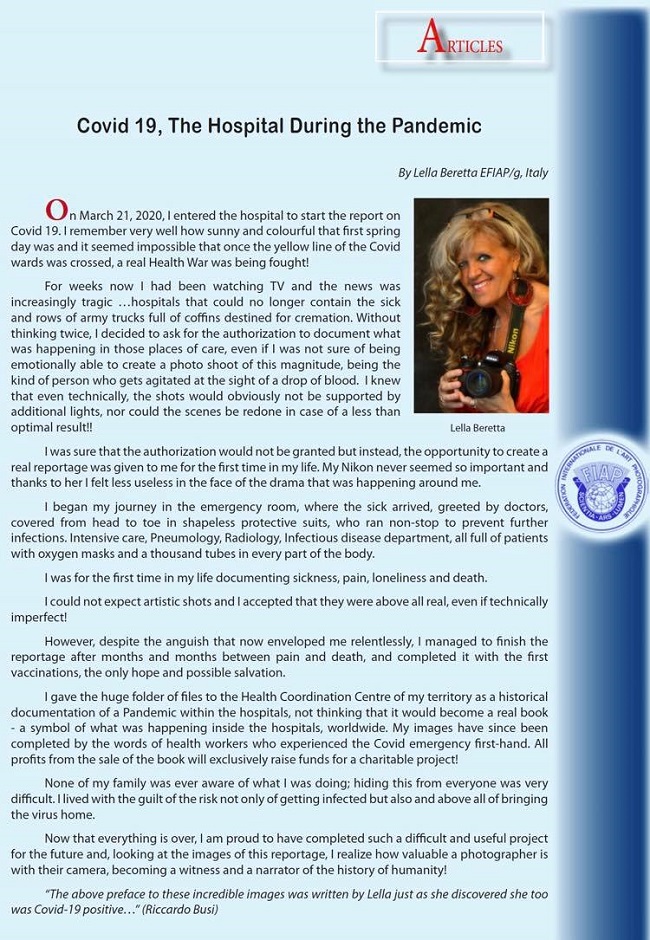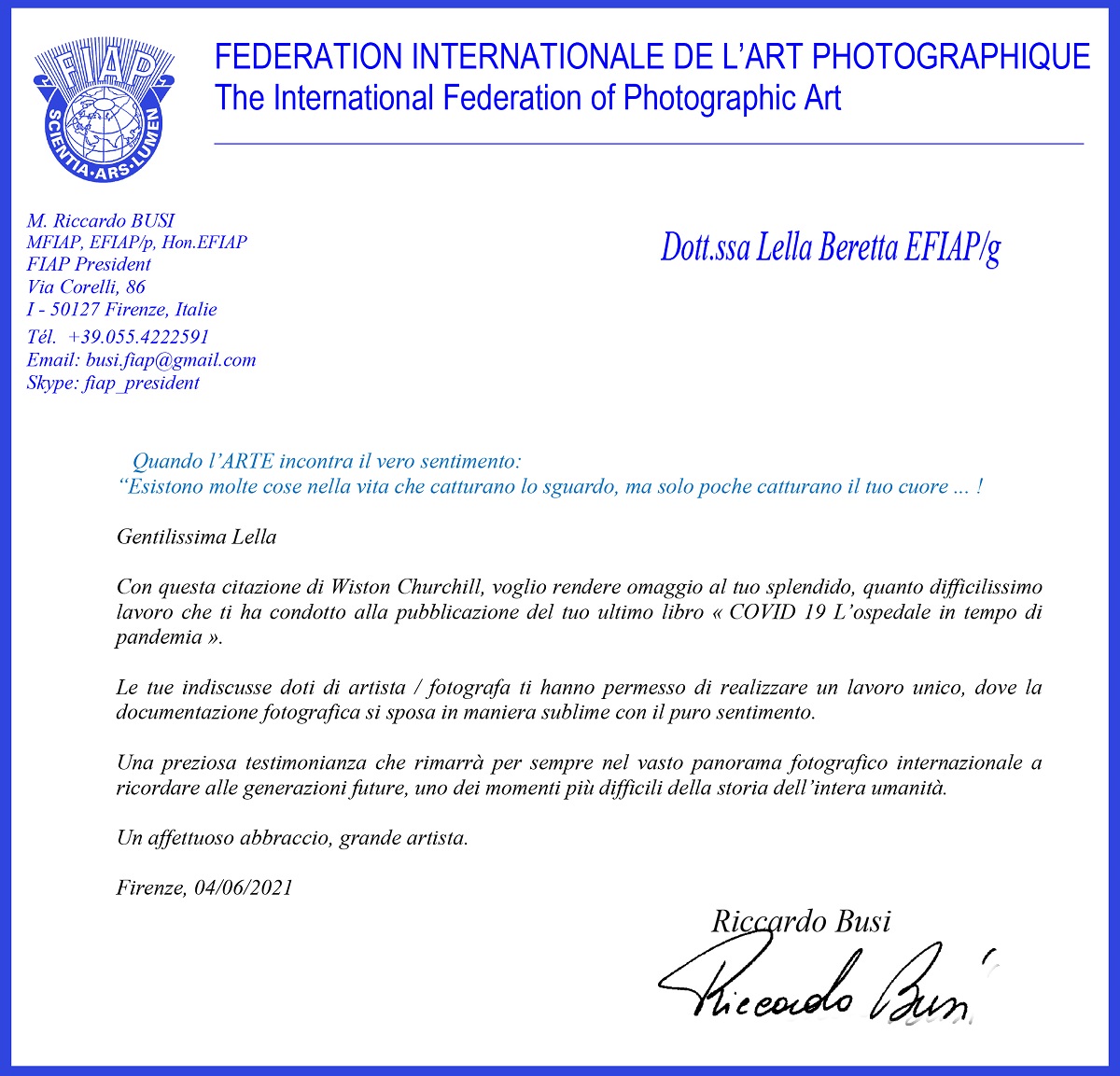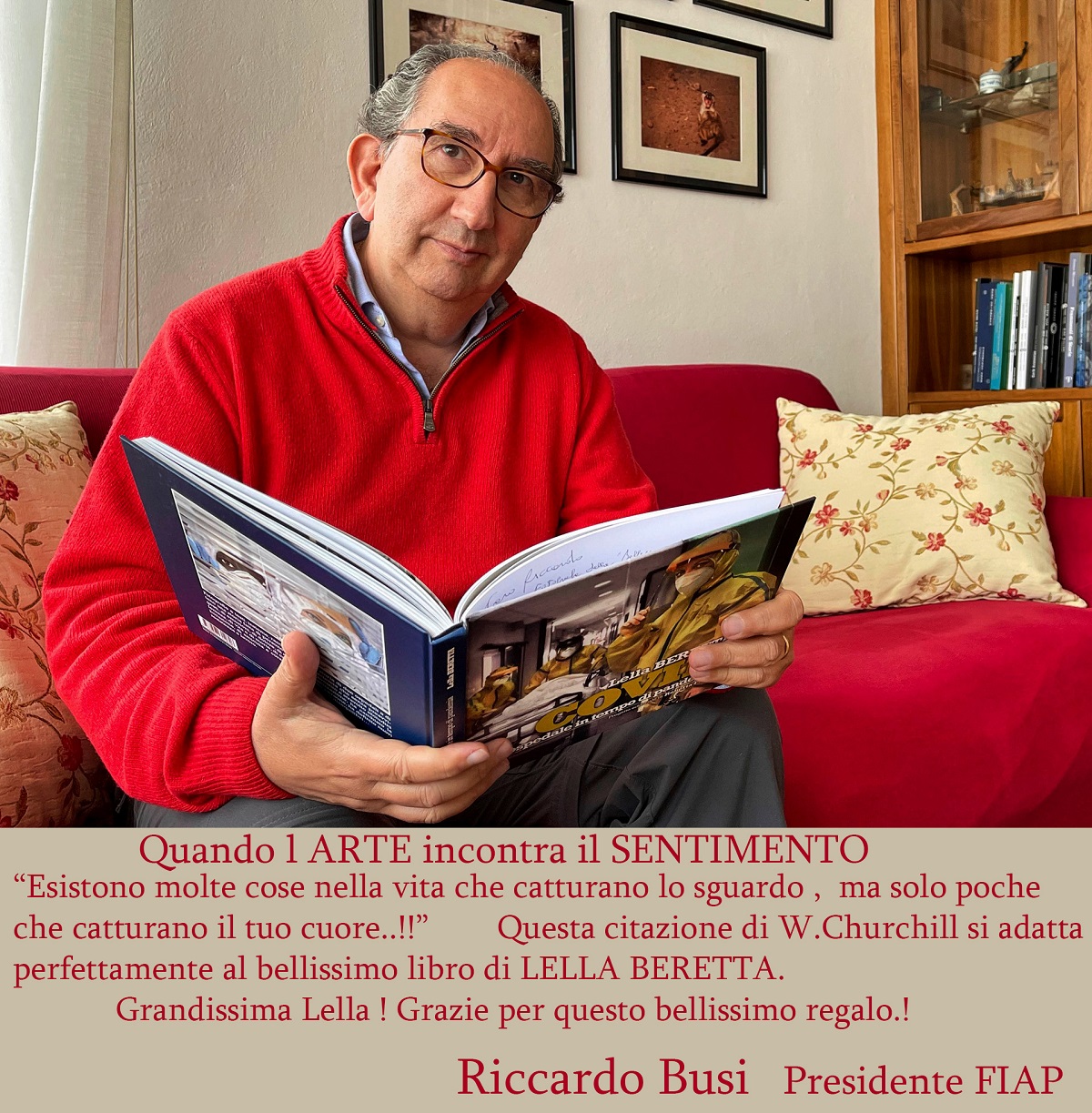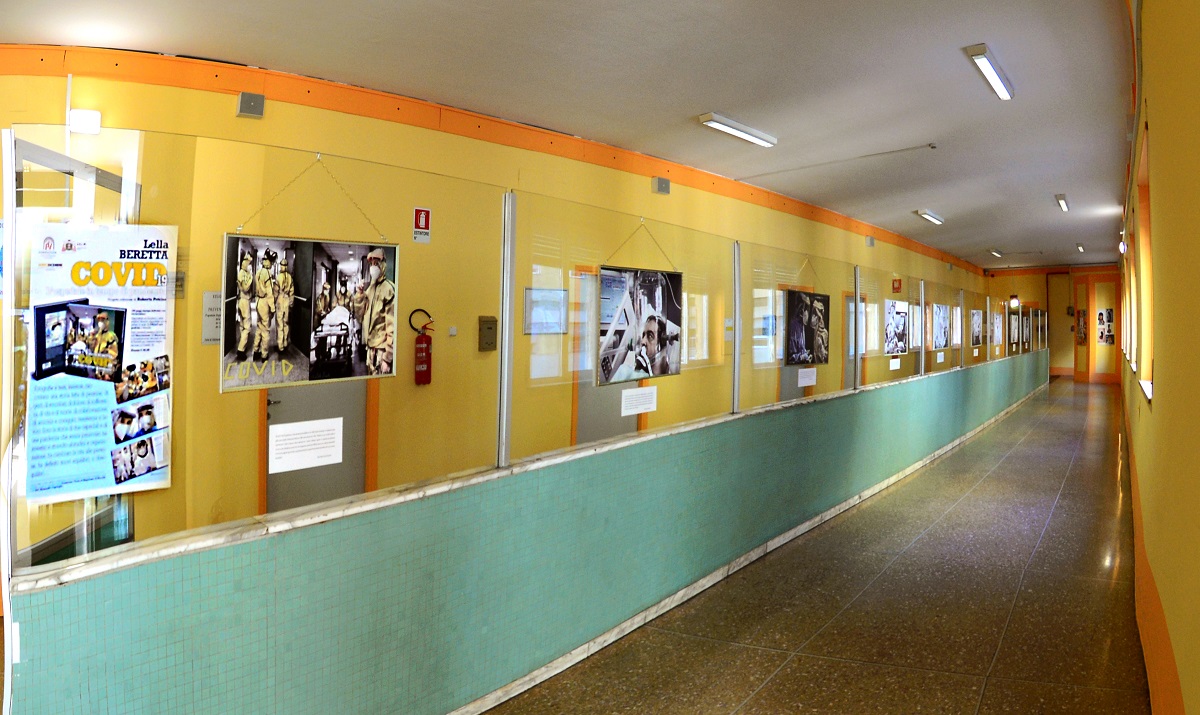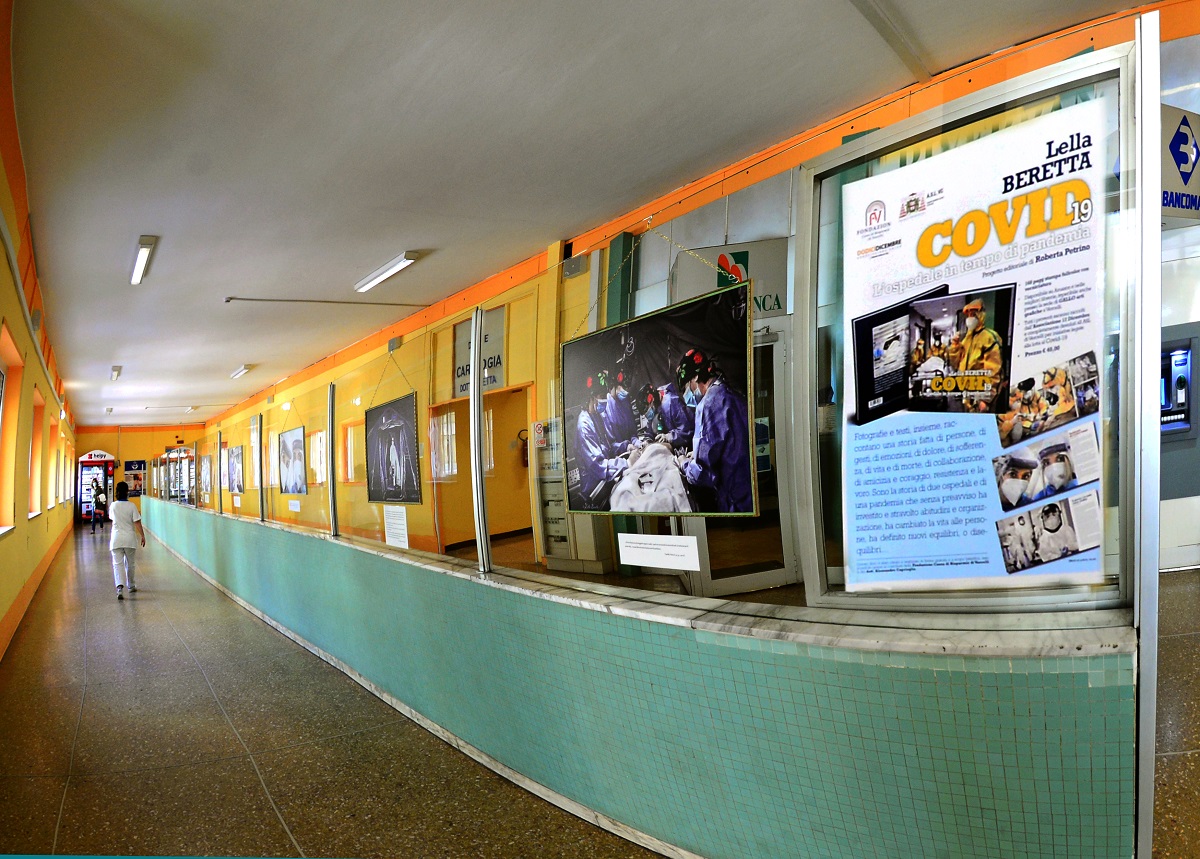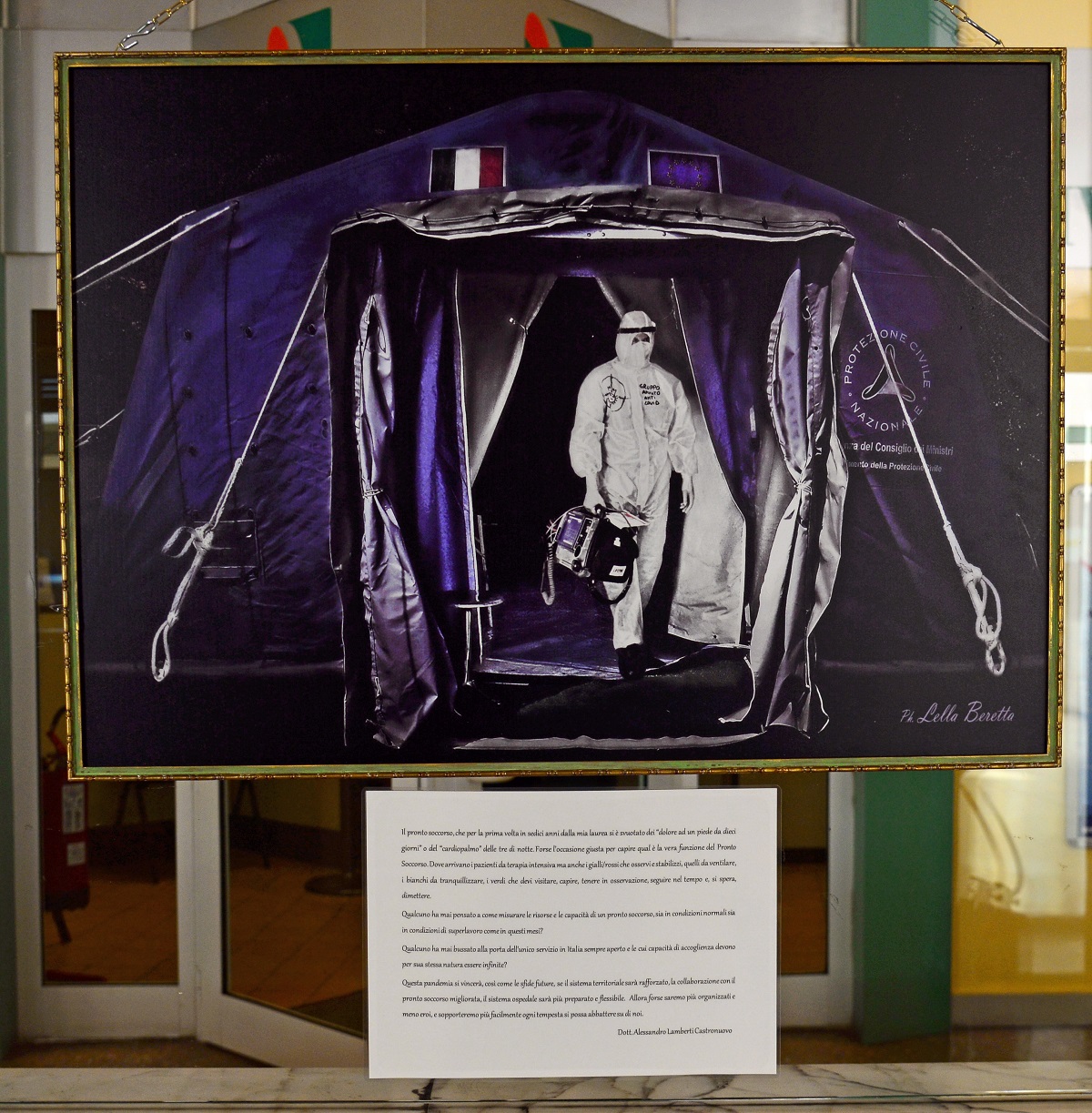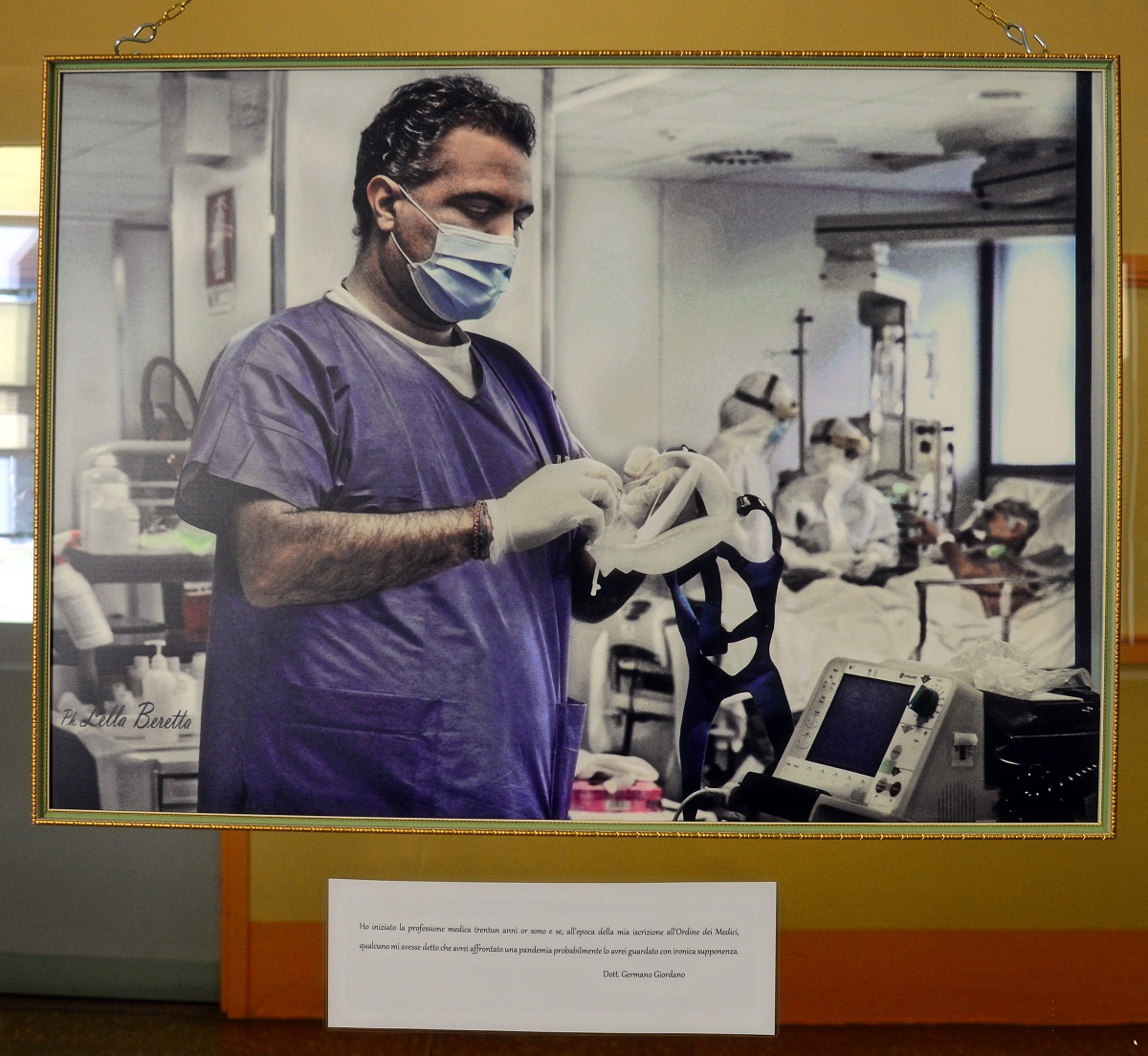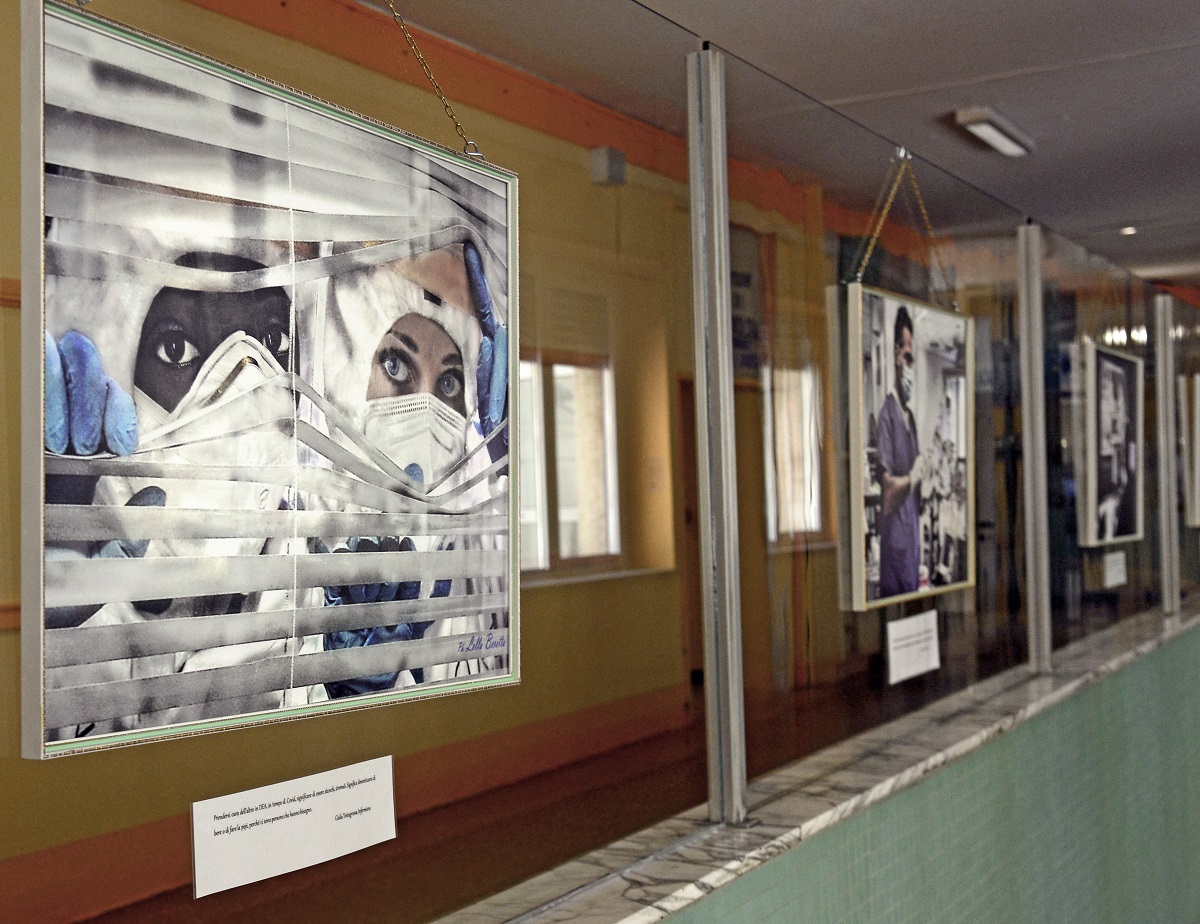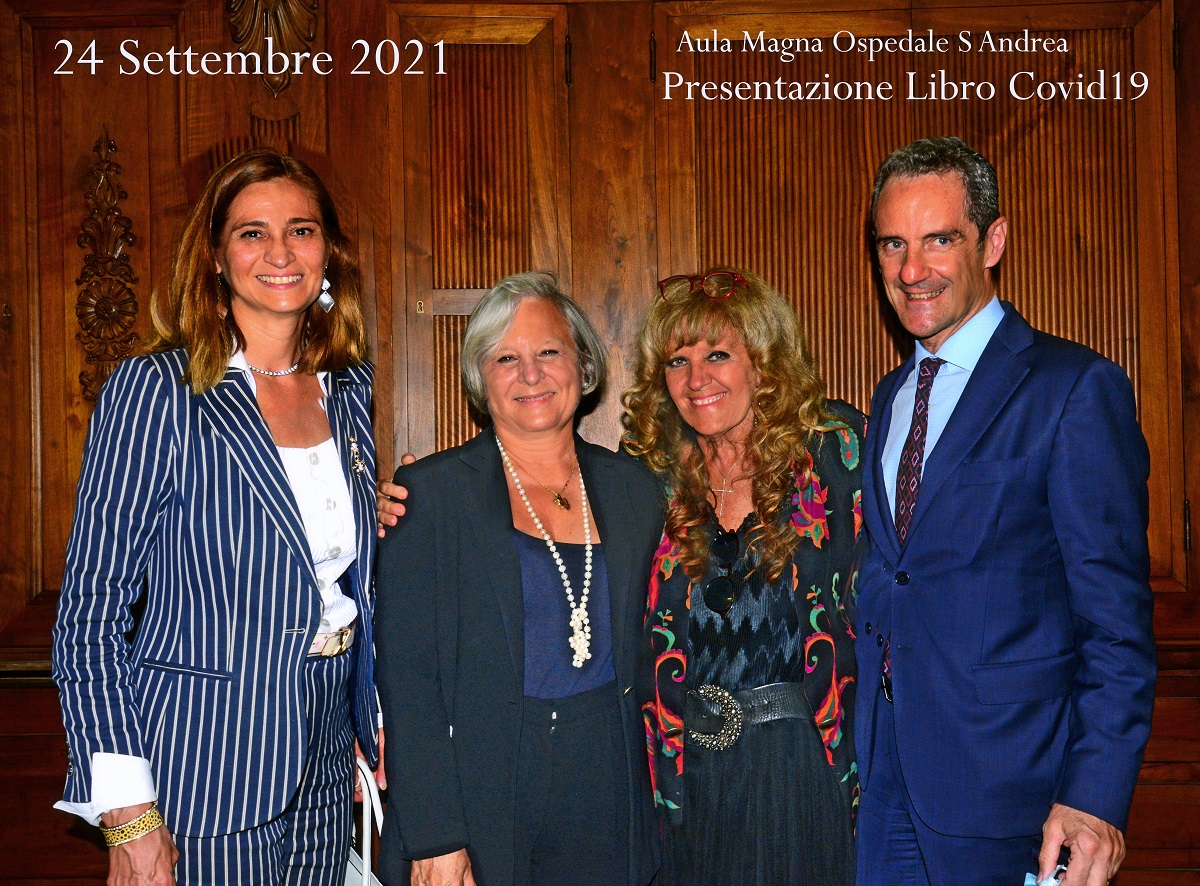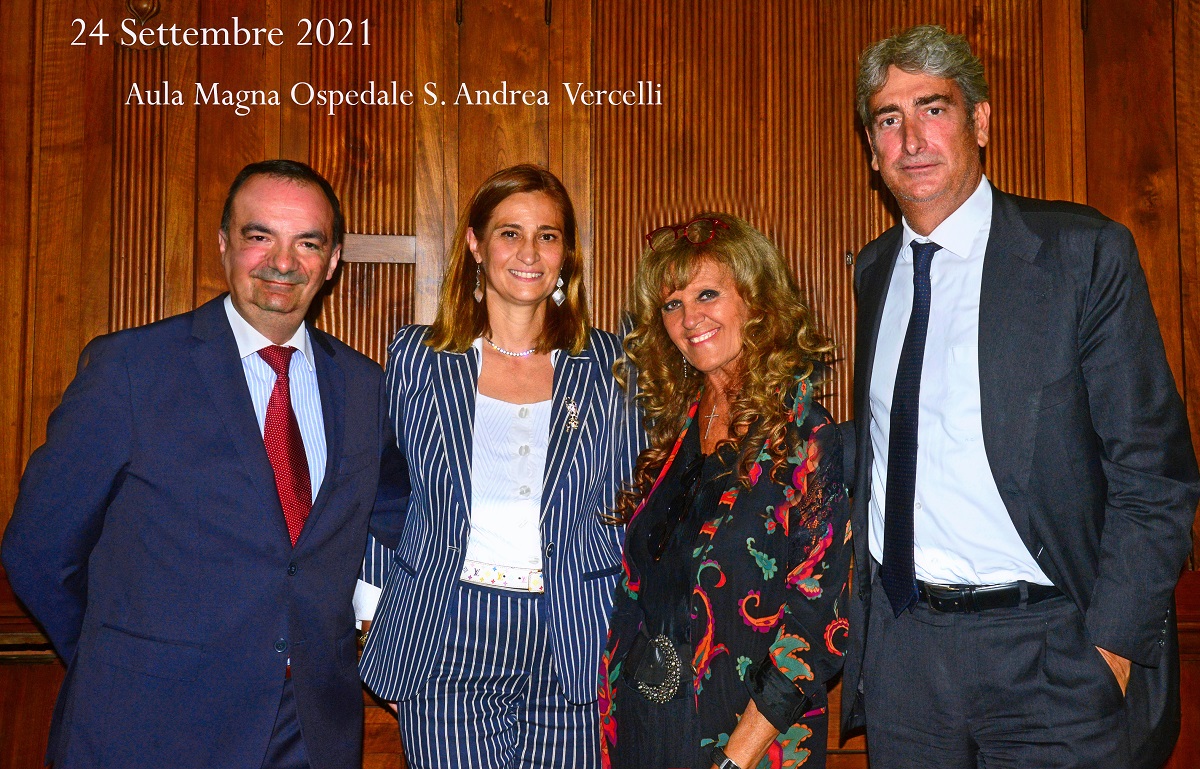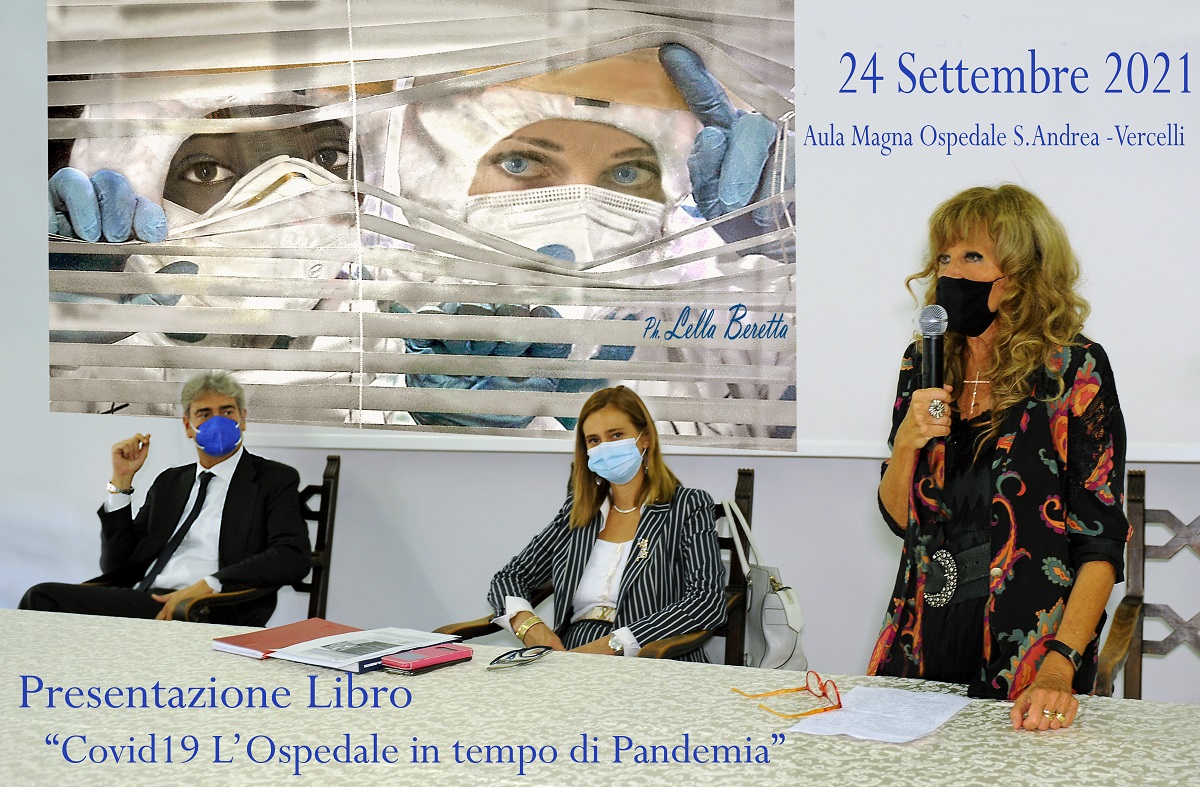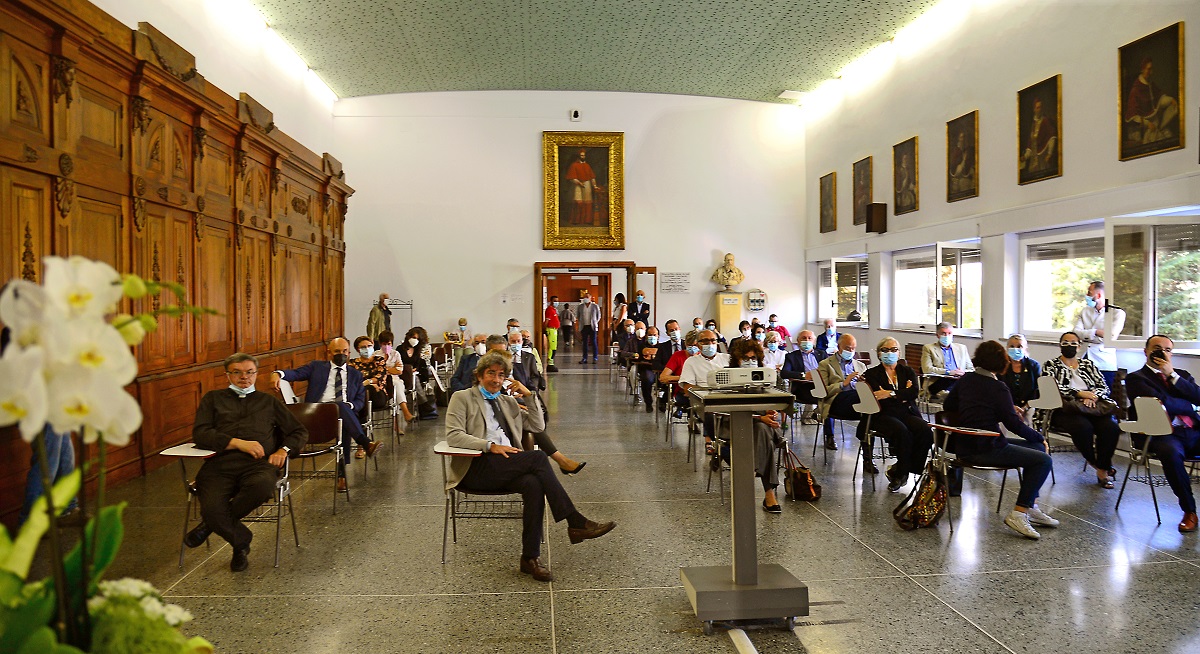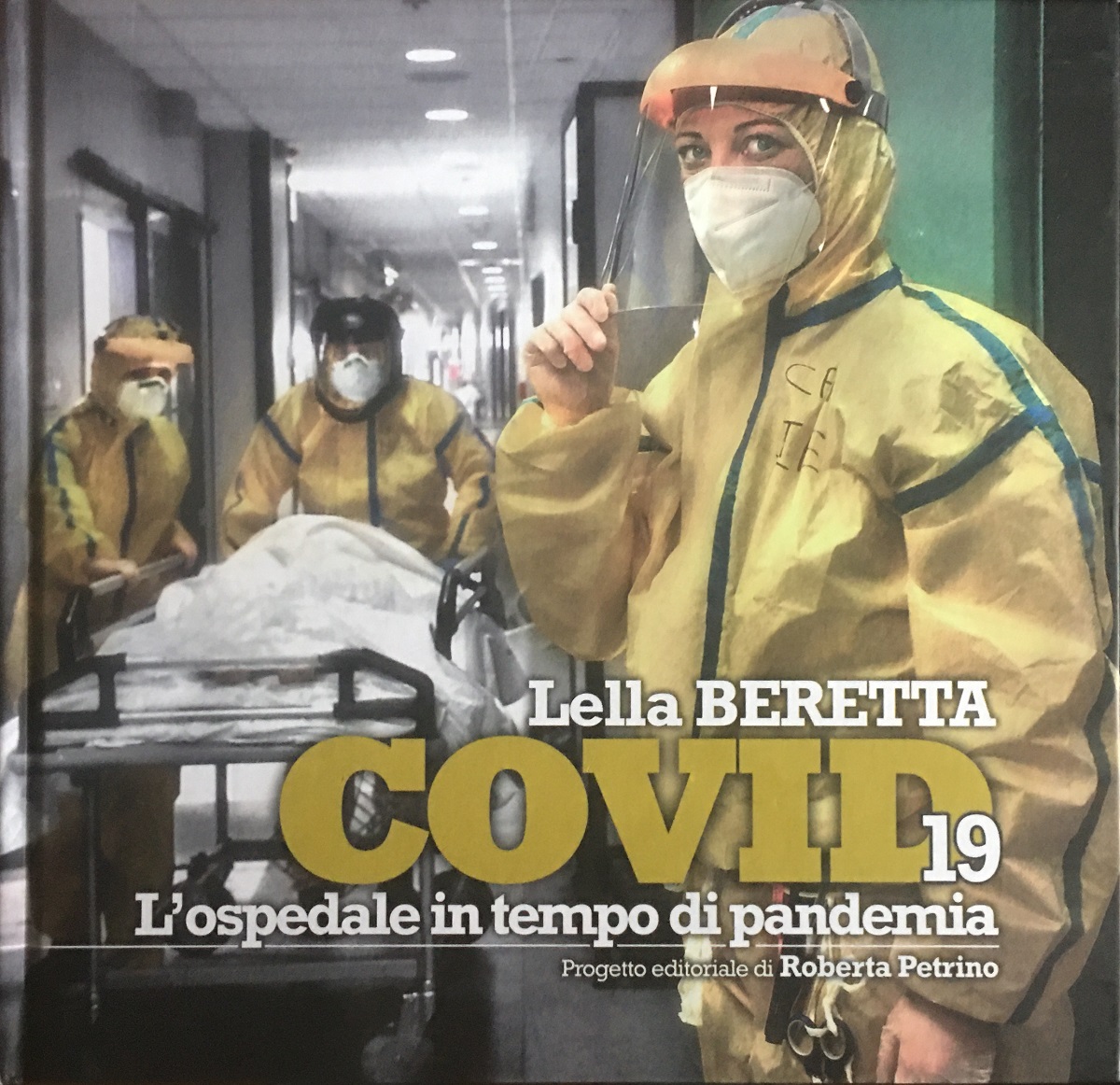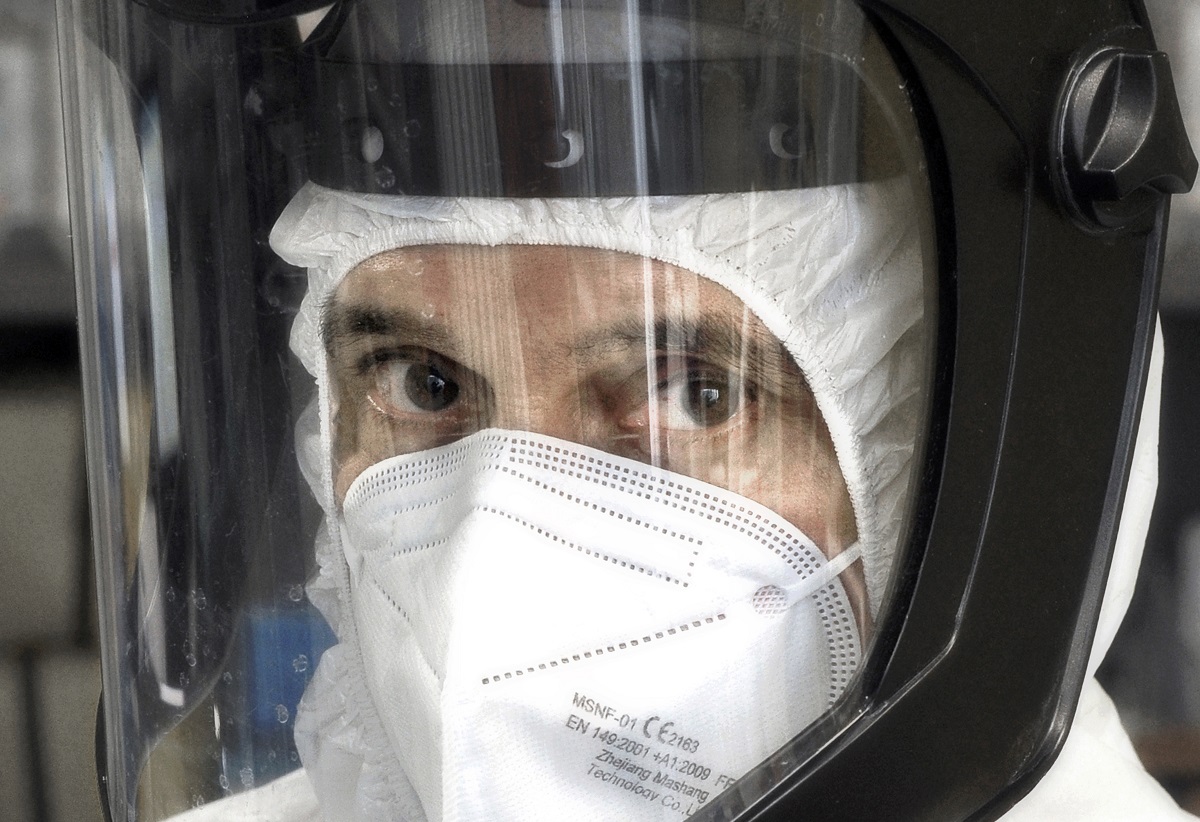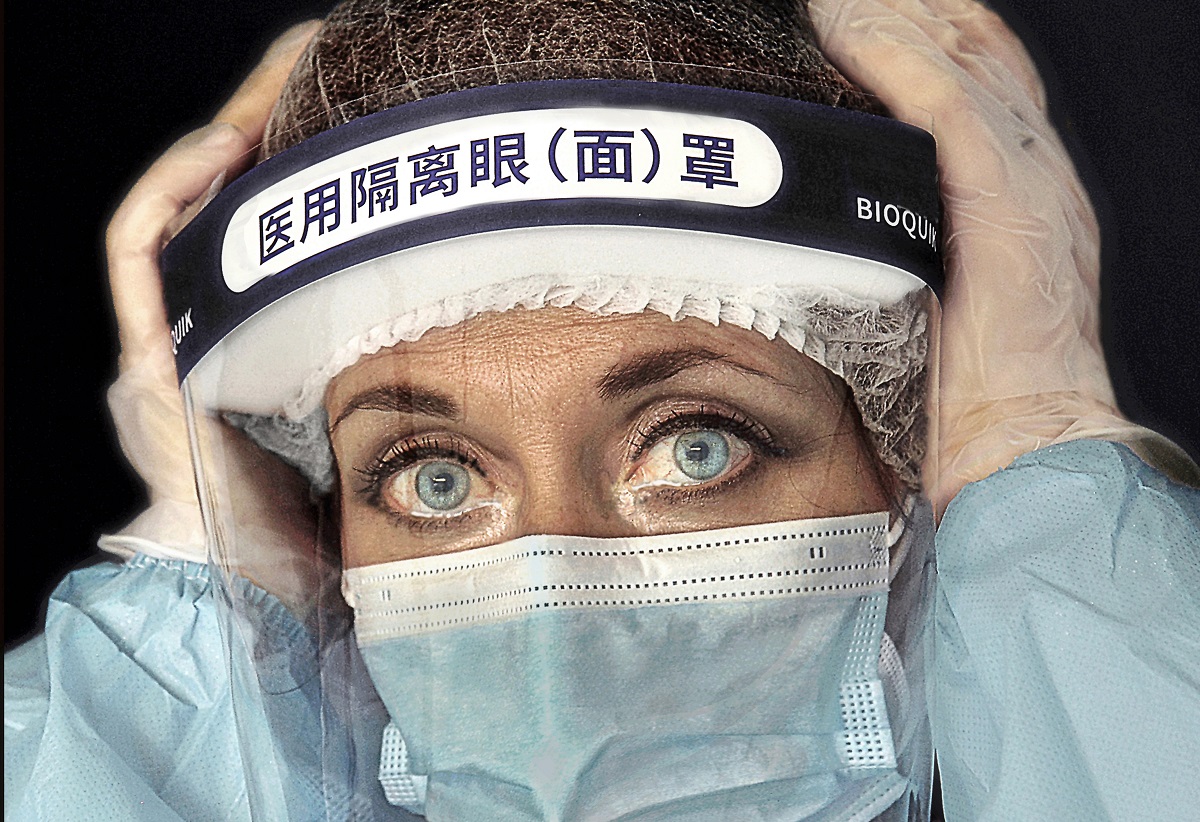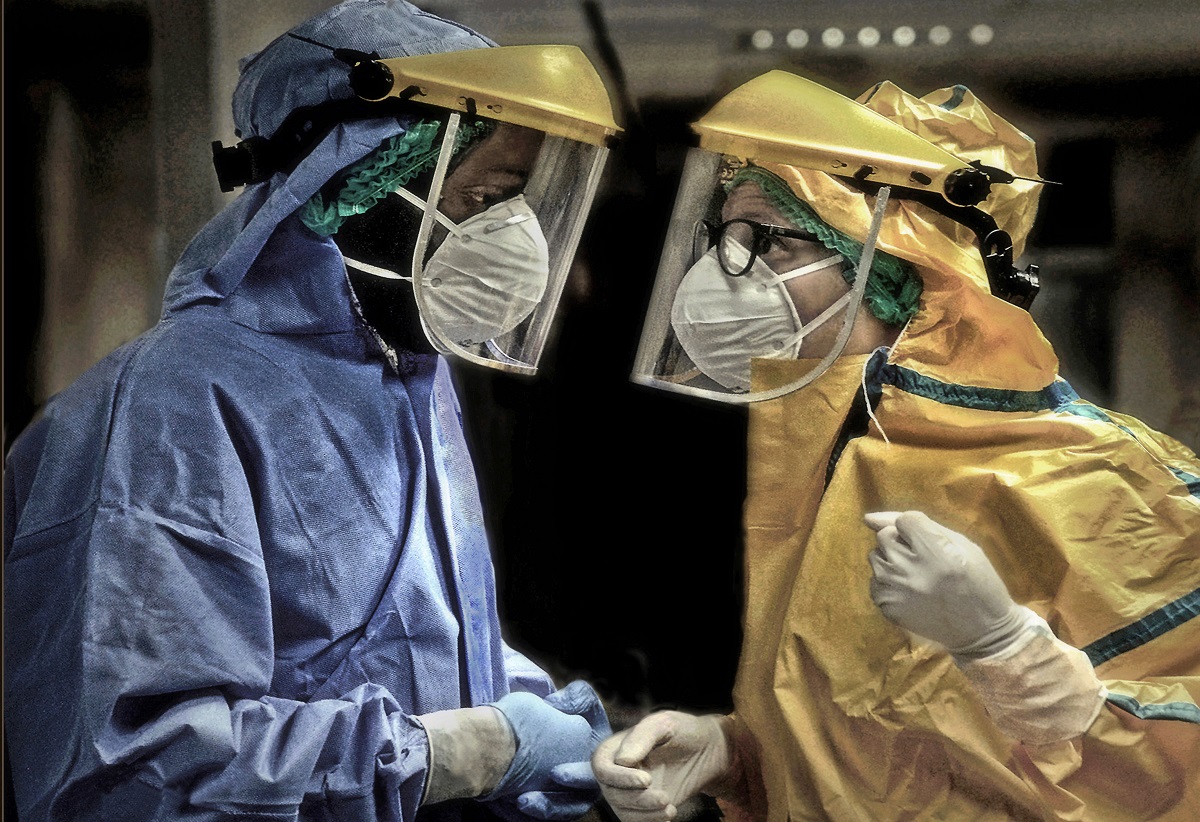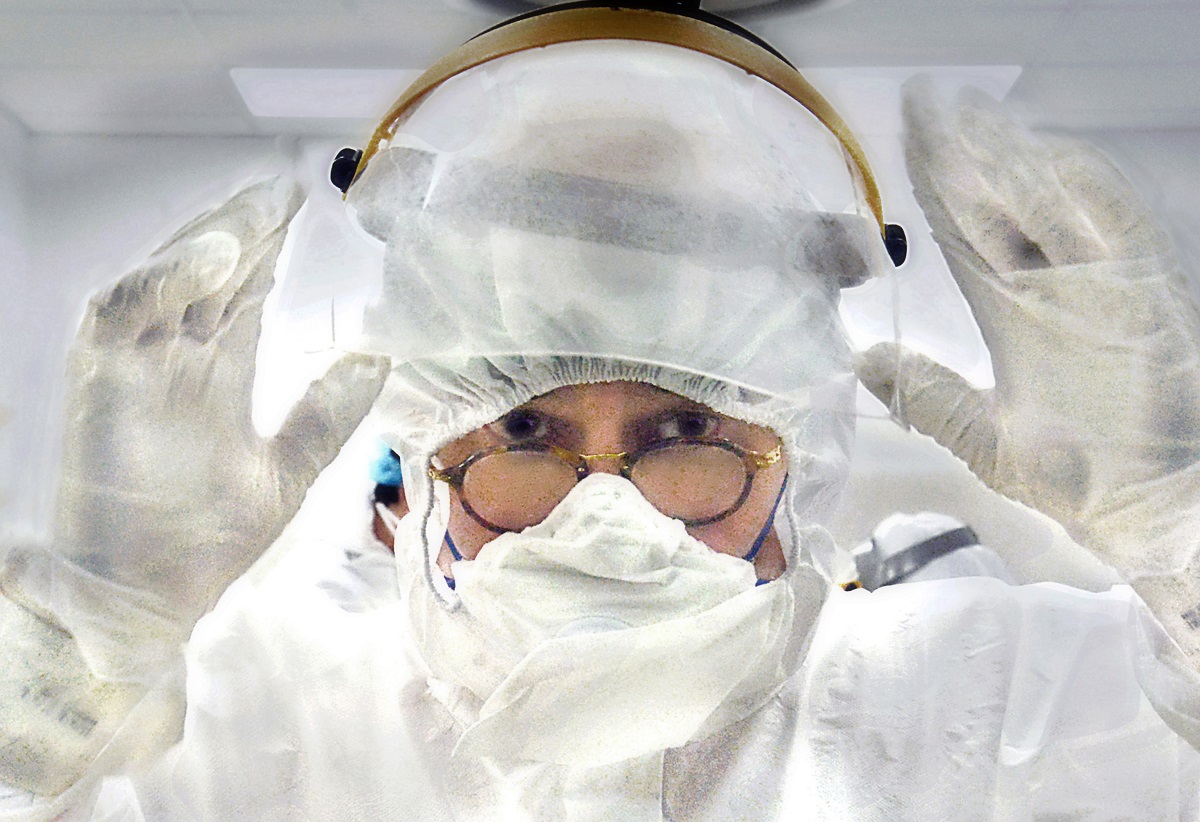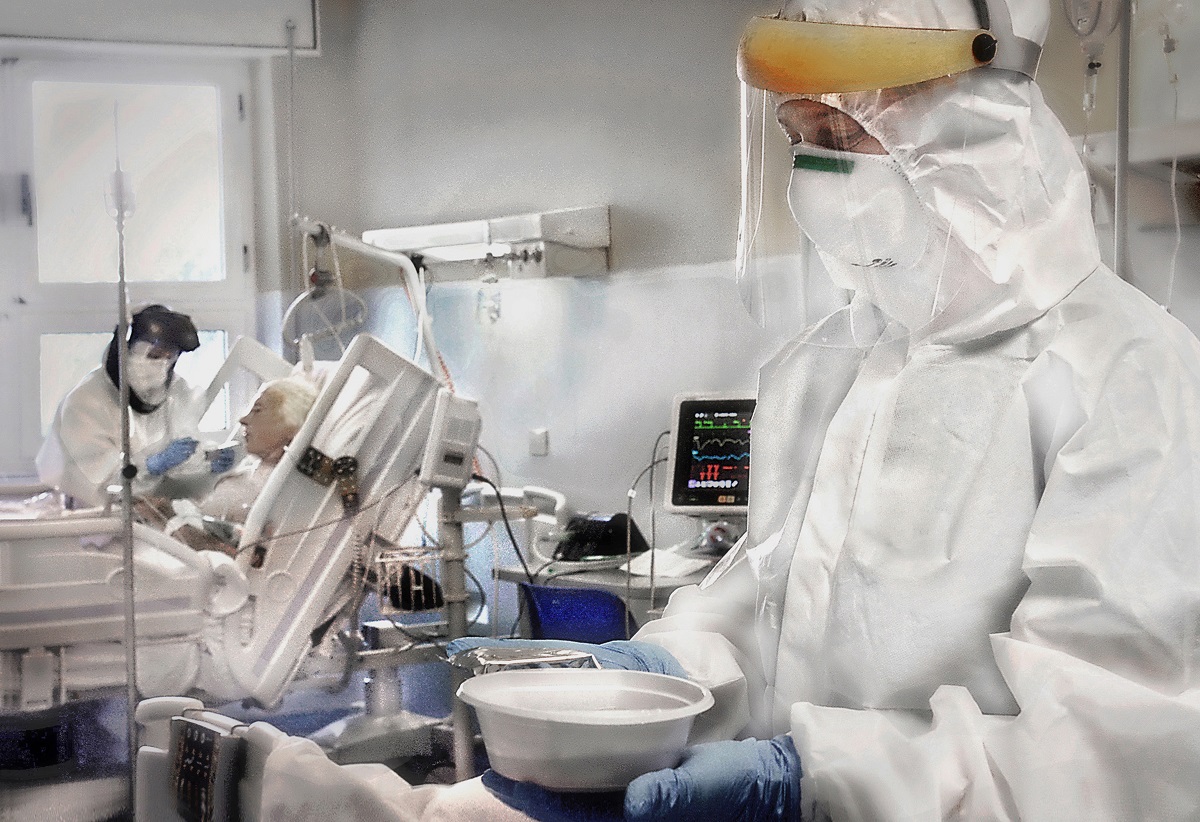By Tiziano Thomas Dossena
“Covid19, L’ospedale in tempo di pandemia” (Covid19, the hospital at the time of a pandemic) is a thorough photographic reportage by the famed Italian photographer Lella Beretta. It is combined by corresponding, meaningful and descriptive chapters written by doctors, nurses, and health workers who have lived, and probably still do on a smaller scale, the tragedy of Covid19 with its impact on society as a whole.
The pictures are vivid, sharp, and emotional, and the cuts are exceptional, as expected by a professional, sensitive photographer such as Lella.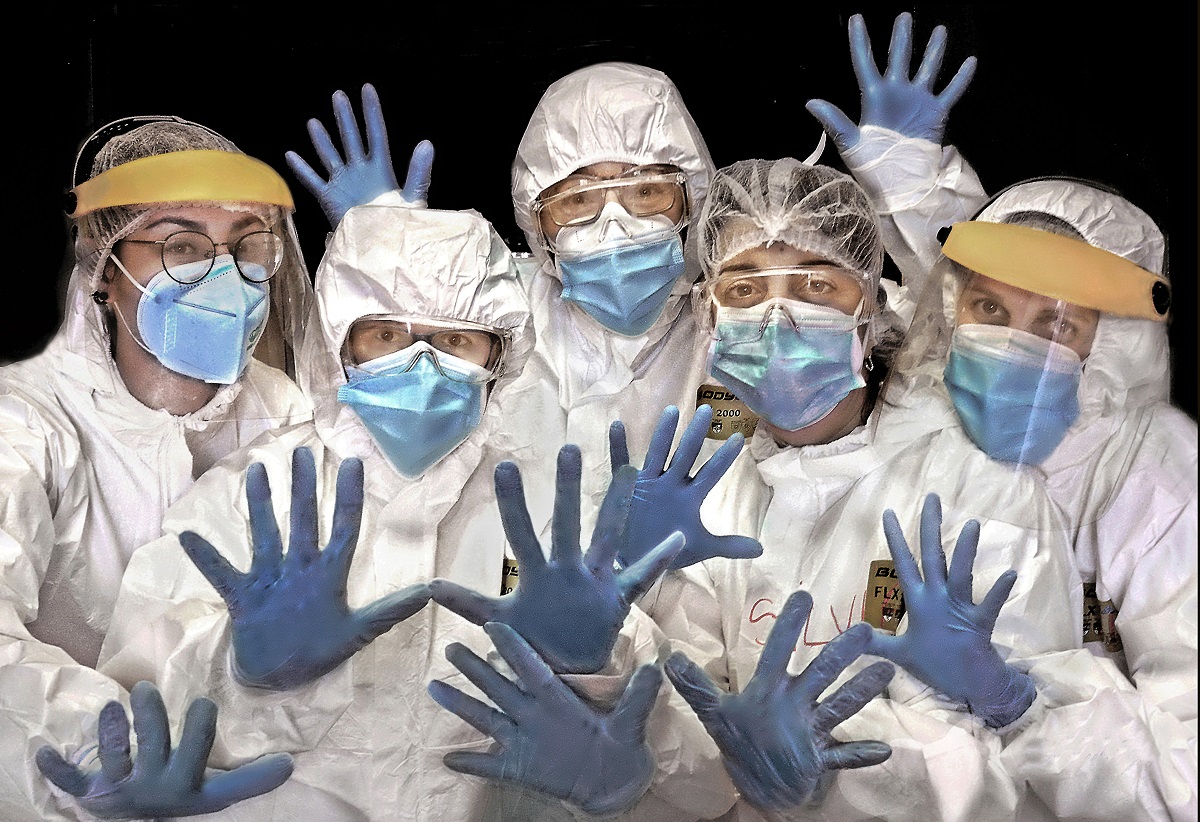 The progress of the text is as haunting as the photographs themselves. The individual articles act somehow as chapters in the development of the thread of Covid19’s story as it impacted two hospitals in Nothern Italy. They carry atypical names such as “The day and the night without any boundary,” “Something more,” “Protection,” “Snapshots of a life,” “Long I basked,” “Sorrowful understanding,” “Rebirth,” “Gratitude”… and are collected into groups titled “The story begins,” “Emotions,” “Tales,” but then again, what was so typical about this pandemic? Nothing.
The progress of the text is as haunting as the photographs themselves. The individual articles act somehow as chapters in the development of the thread of Covid19’s story as it impacted two hospitals in Nothern Italy. They carry atypical names such as “The day and the night without any boundary,” “Something more,” “Protection,” “Snapshots of a life,” “Long I basked,” “Sorrowful understanding,” “Rebirth,” “Gratitude”… and are collected into groups titled “The story begins,” “Emotions,” “Tales,” but then again, what was so typical about this pandemic? Nothing.
The choice of images and articles are a perfect match and allow the reader to appreciate the sacrifices that health workers all over the world had to endure; conversely, there is much more than that in the experience that this beautiful volume offers through its imagery. Lella Beretta has the ability to convey the same emotions that she feels the moment she takes a picture through the image itself. It’s a gift, a talent that only a few chosen photographers have. Her pictures are the product of an artist, and the viewer relives somehow her personal experience by observing them.
Lella Beretta has the ability to convey the same emotions that she feels the moment she takes a picture through the image itself. It’s a gift, a talent that only a few chosen photographers have. Her pictures are the product of an artist, and the viewer relives somehow her personal experience by observing them.
Furthermore, this volume lets the reader visit, if only visually, a section of a hospital that only a few chosen people ever see, unless they are infected and in poor condition.
This book offers a great opportunity for everyone to view the arrival, development, diffusion, and treatment of the Covid 19 virus in Italy while at the same time allowing the reader to visualize the emotional impact it had with its isolation and deaths. “Covid19, L’ospedale in tempo di pandemia” is a book that has found a way to describe a tragedy while still depicting in a poetic way the dramatic moments connected to it. I personally hope that an English language version will be available soon.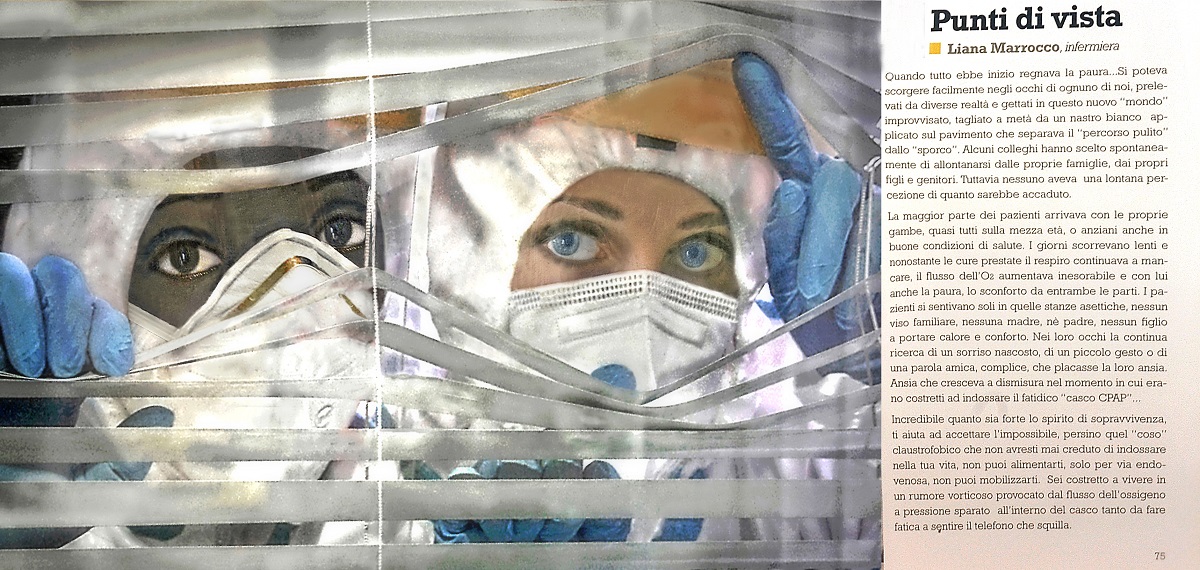
L’Idea Magazine: Lella, how did it come to your mind to go into the hospital and take all the photographs you took?
Lella Beretta: In March 2020, an unpredictable and dramatic lockdown literally imprisoned me in my home and prevented me from moving around, except for a short walk twice a day with my dog.
The world around me no longer had joy, it was distressing and the few people I met, protected by masks and gloves, stayed away from everyone, terrified by the risk of contagion. A dangerous and lethal virus that was spreading with great speed in the world had destroyed my certainties in an instant, had taken me away from my children, my friends, canceled my appointments, events, exhibitions, and travels. I watched TV and the dramatic news of what had now become a pandemic accompanied my silent and lonely days.
At the time, army trucks full of coffins were taken from Bergamo to nearby towns to be cremated because there was no more room for more dead people in the city’s cemetery. When they began to parade on the news, I decided that I too had to do something and that I could not just stand by and watch. I, therefore, decided that for the first time in my life I should make a report and tell, as war photographers do, what happened to a Covid patient when he entered the hospital, his journey through the wards of Dante’s Inferno, his treatment, his healing or death. 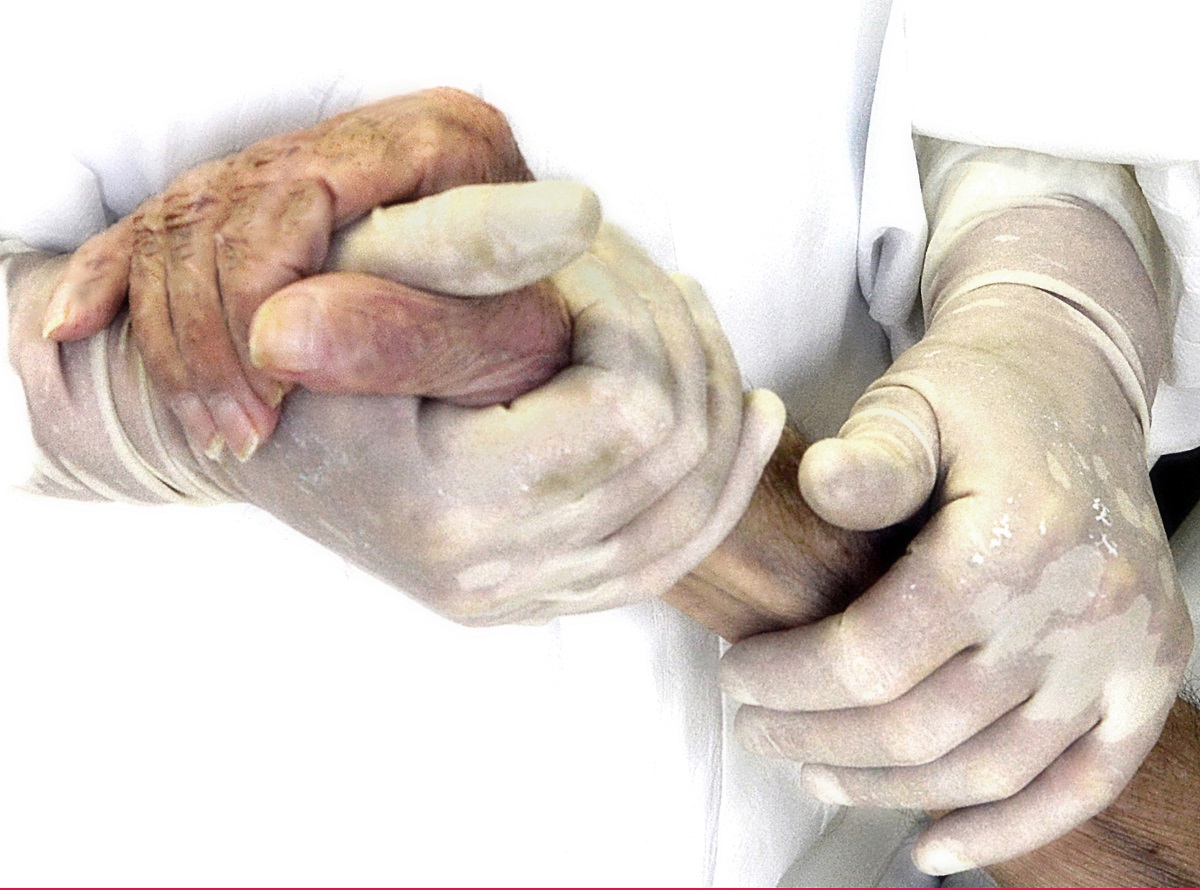 I wanted to tell how the Hospital, the most armored place on the planet, protected itself and those infected by the virus, and how overwhelming was the loneliness of Covid patients and their death, which occurred without the caress of a child or a life partner but only accompanied by the compassionate smile of a health worker, tucked into a spacesuit from which only the eyes were leaking, tired and distressed by what was happening…I had the authorization from the Hospital’s General Director, convinced that in order not to forget it was necessary to be able to tell this story, and so began my documentation, the most difficult, painful, and courageous of my life as a photographer!
I wanted to tell how the Hospital, the most armored place on the planet, protected itself and those infected by the virus, and how overwhelming was the loneliness of Covid patients and their death, which occurred without the caress of a child or a life partner but only accompanied by the compassionate smile of a health worker, tucked into a spacesuit from which only the eyes were leaking, tired and distressed by what was happening…I had the authorization from the Hospital’s General Director, convinced that in order not to forget it was necessary to be able to tell this story, and so began my documentation, the most difficult, painful, and courageous of my life as a photographer!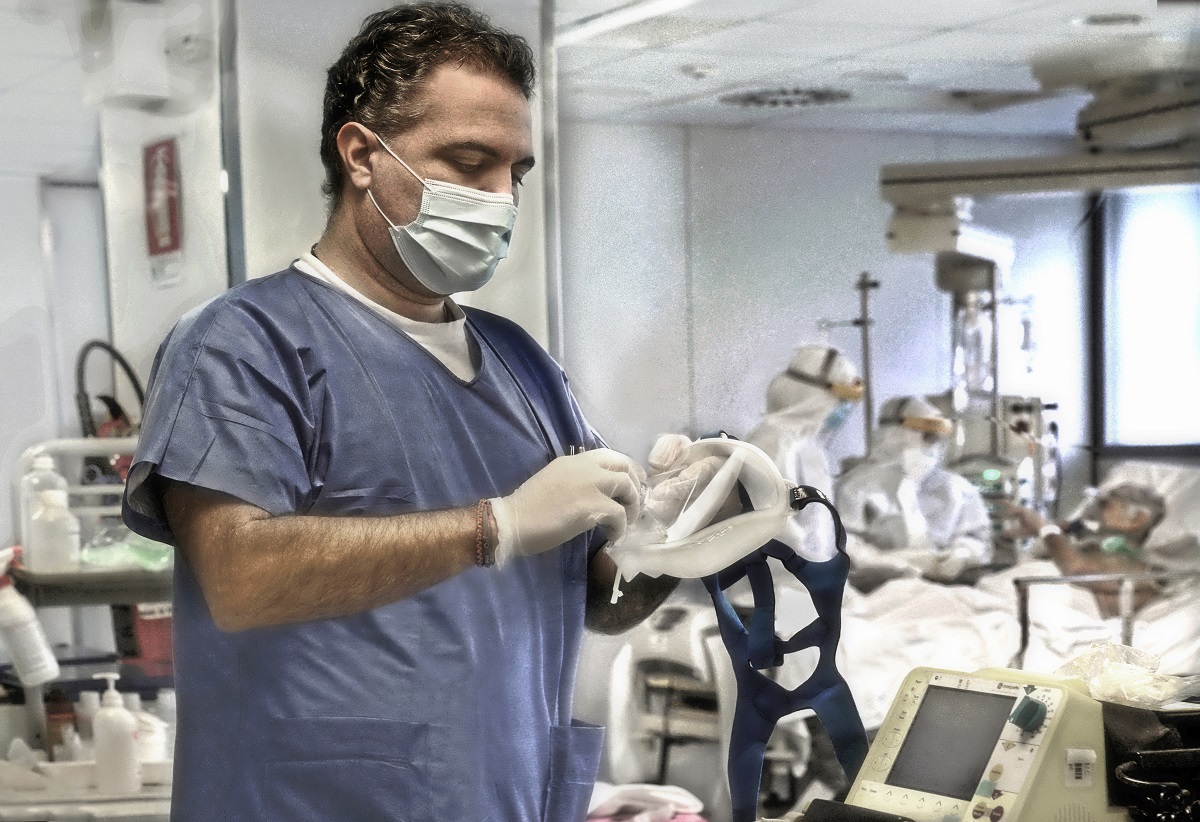
L’Idea Magazine: You took great risks and, in the end, Covid too. Regrets?
Lella Beretta: There were risks, and how!! I noticed it almost immediately. When my journey began I found myself in front of space figures running from one room to another protected from head to toe, unrecognizable, lowered into diving suits, with double gloves and double masks, visors, ankle boots … in short, figures from science fiction films.
A yellow line drawn on the floor divided the clean area from the dirty one, that is, dangerous not to be crossed if not protected beyond belief. To visit and get closer to Covid patients, often intubated or with their head tucked into a helmet to help their breathing, it was necessary to carry out the ritual of protective “dressing”, and not to leave even an inch of our body uncovered.
At the end of the visits, overalls, gloves, masks, hats, shoe covers … were thrown into bags to be hermetically sealed in order to re-enter the so-called “clean” part of the ward, where the virus had no possibility of circulating. And then, disinfectants everywhere… but especially on the hands.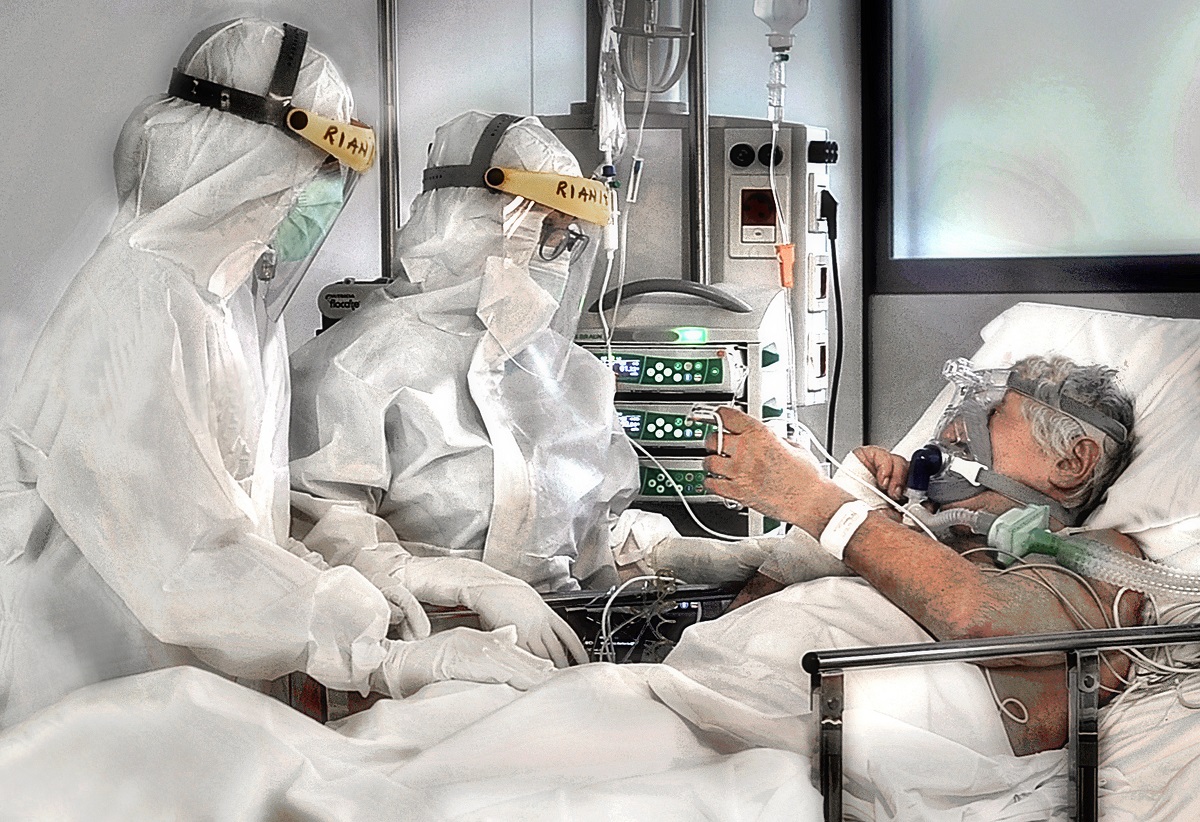 I protected myself as well, naturally, but in the first months of the infection, I saw doctors and nurses also get sick and die and I understood that perhaps my courage was recklessness. In any case, I finished my reportage without consequences, but shortly before getting vaccinated I fell ill through a family contact, and in the days when my book was printed I met the virus in person.
I protected myself as well, naturally, but in the first months of the infection, I saw doctors and nurses also get sick and die and I understood that perhaps my courage was recklessness. In any case, I finished my reportage without consequences, but shortly before getting vaccinated I fell ill through a family contact, and in the days when my book was printed I met the virus in person.
I experienced directly the devastating effects of this disease and my husband, who was also infected, ended up in a hospital with serious, bilateral pneumonia, and was saved by a miracle.
No regrets … maybe I would have regretted not having done so. From the very beginning, I felt this project as a “mission”. Nobody was allowed to enter the hospital, especially in the Covid wards. I had had this pass for a very specific and very important purpose … I had to create a “Historical Document” to tell this tragic health emergency that should never be forgotten …
And this, proudly, I did…
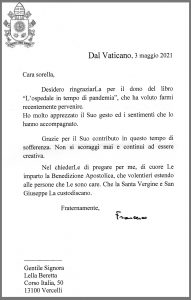
L’Idea Magazine: When did it occur to you that all these magnificent photographs, so full of humanity, could become a book?
Lella Beretta: At the beginning, I only wanted to give the shots of this Reportage to the Hospital Management … but then the Pandemic did not cease and continued its dramatic journey allowing me, in spite of myself, to complete the story more and more.
The vaccine was the light at the end of the tunnel, and having covered all the stages of Covid19 I understood that, with the help of an emergency room doctor who took care of the editorial project and the texts written by doctors, nurses, and health workers who had faced the hospital emergency, a beautiful, true, authentic book full of exciting images and profound texts could easily be born. And so it was.
L’Idea Magazine: How did you go about creating and financing the book?
Lella Beretta: Since I had no personal profit in mind, it was decided to use any profit from the sales of the book to purchase the latest generation respiratory compressors for the hospitals photographed, which are very useful for the Pneumology, Cardiology, and the Resuscitation and Intensive Care departments.
For the printing, we found two benefactors (Dr. Alessandro Caprioglio and Fondazione Cassa di Risparmio di Vercelli) who took on the total cost of the printing. A non-profit organization acted as a guarantor to convey the money collected directly to the hospital and then transform them into the equipment established at the end of the sale.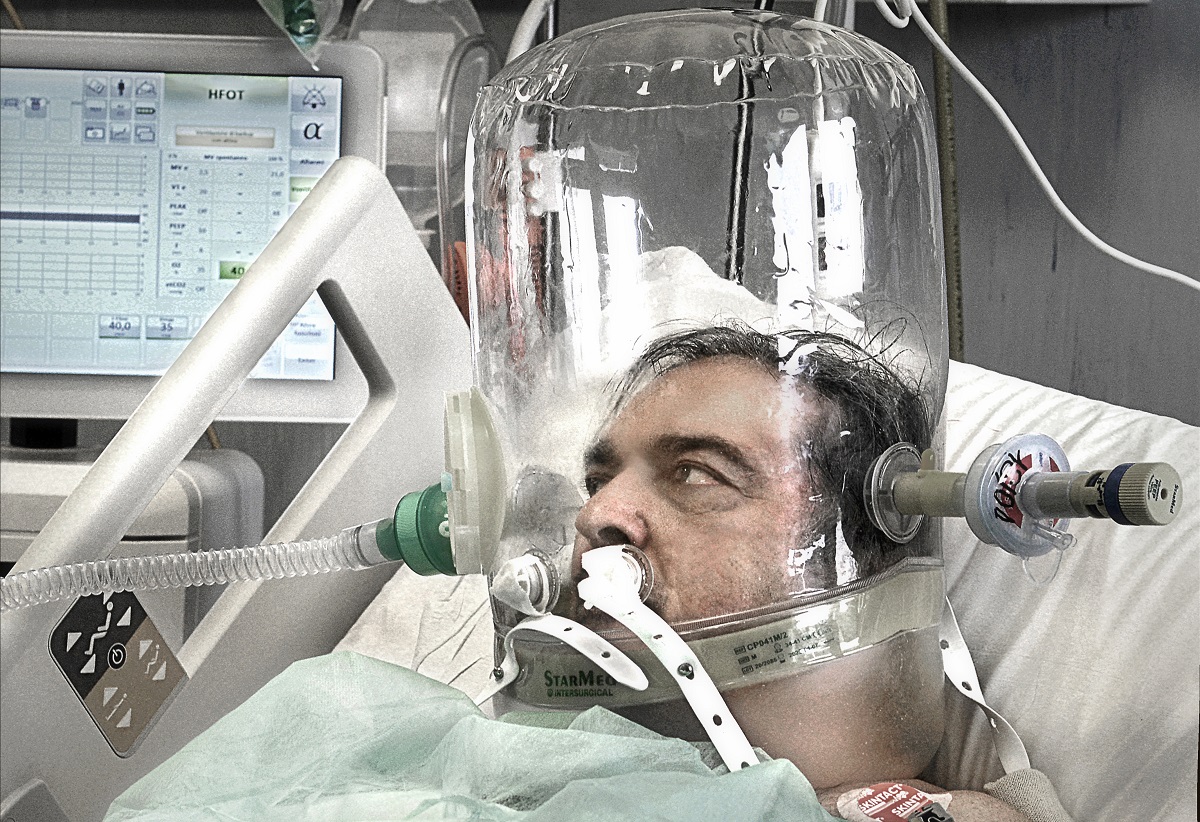
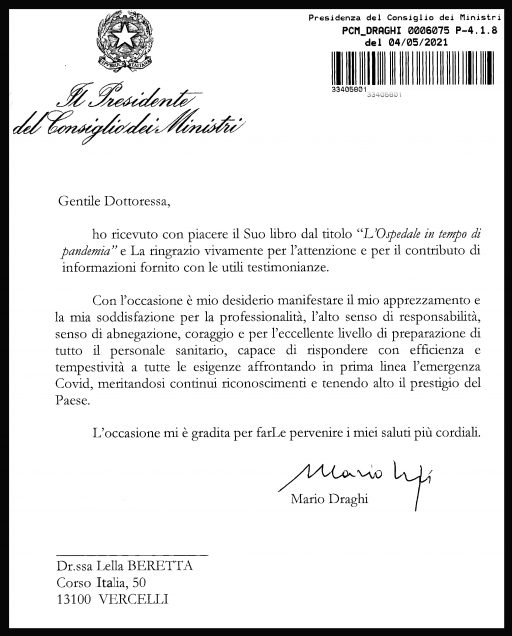
L’Idea Magazine: Are you planning to bring the photography exhibition to New York?
Lella Beretta: More than thinking of bringing the Photo Exhibition to New York … I DREAM that this could happen!
As you well know, organizing an exhibition in another continent today, precisely because of the anti-Covid measures, is very difficult and complicated.
You have to find a location, send the pictures, have someone take care of the organization from there… Of course, it would be a fantastic event and would tell something that everyone in some way knew directly or indirectly, something that changed everyone’s life … it would open a window on prohibited wards that no one in this year and a half has been able to see, and maybe it would make those who have not yet done so get vaccinated, so as not to become one of the sick people photographed in my book.
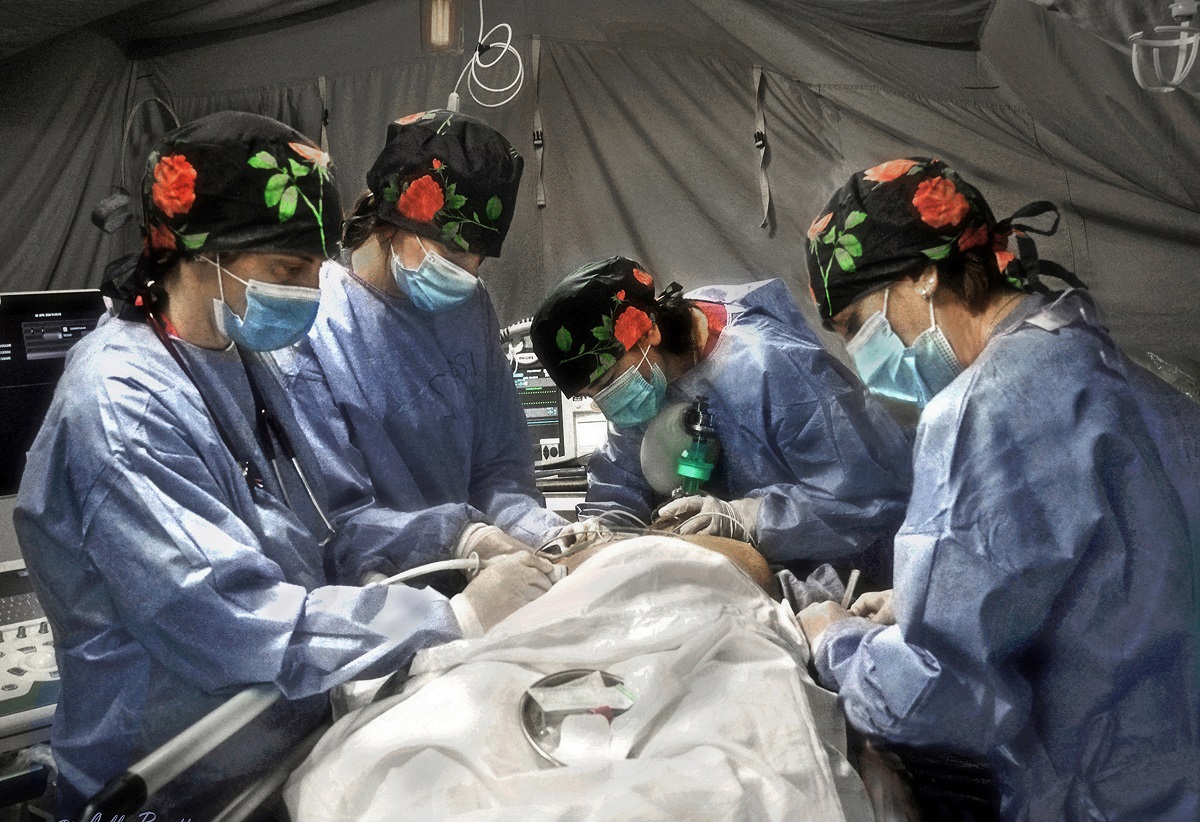 L’Idea Magazine: I know you already have an English version in the works. Can we expect to see it in the US?
L’Idea Magazine: I know you already have an English version in the works. Can we expect to see it in the US?
Lella Beretta: A very good translator, Andrea Serpieri, after looking at the images and reading the book, became so enthusiastic that he decided to commit himself, free of charge, to its translation into English … It is a truly commendable gesture that I really appreciated. We could have used this translation for a reprint destined for international circulation, and I believe it would have been a resounding success since today it is one of the few photographic books with images taken “live” in healthcare facilities … But a home has not yet been found for it, we need a publisher that will “adopt” it, publish it and sell it all over the world.
We are waiting for the Miracle…
Are you by any chance one of the Saints who work miracles on earth? Or do you know anyone?
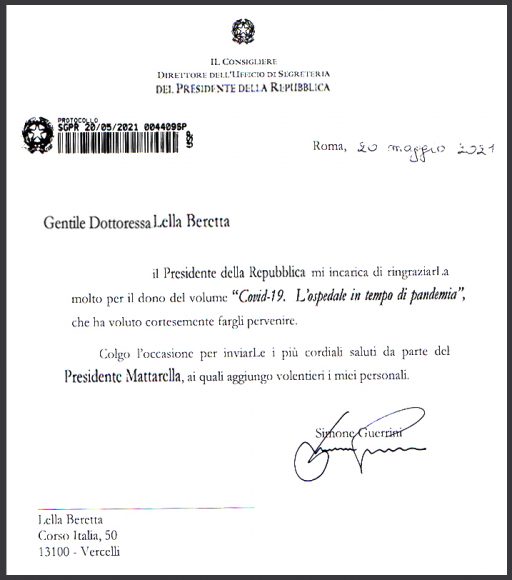
L’Idea Magazine: A message for our readers?
Lella Beretta: The year I spent in the hospital, next to the ‘Cursed Virus,’ even if as a spectator, changed me a lot.
I, as a Photographer of Beauty and Joy, from the Paradise where I lived, found myself catapulted into the circles of Hell and I knew and told about Illness and Death. I saw many people enter with breathing difficulties, greet their loved ones for the last time, and then leave, after being wrapped in a sheet soaked in disinfectant, in a coffin…
In short, the messages that I could leave from this experience of mine to the readers of your beautiful Magazine would be many … but I would like one in particular to reach them, and it is the awareness of the fragility of us human beings.
We who travel in space and improve our lives every day with more and more sophisticated technological discoveries, we who communicate in a few seconds with the whole world through the Internet and who experience the power and intelligence of our mind every day, here we are, so strong and sure of our strength, and we could at any moment be annihilated by an invisible, little-known and lethal virus…


